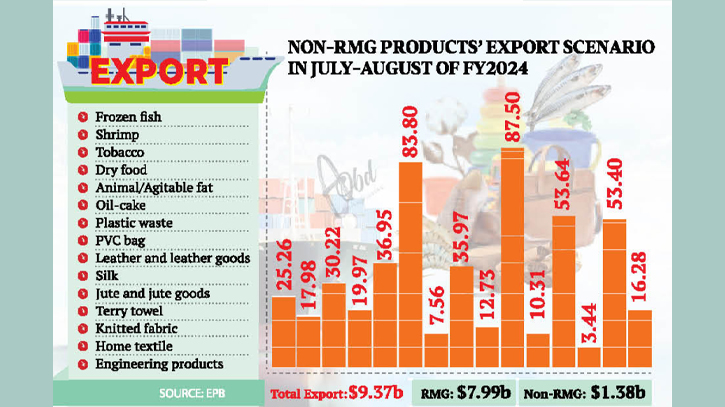
Photo : TDM
While Bangladesh earns foreign currency through its exports, the country's heavy reliance on the ready-made garment (RMG) sector for overseas revenue is evident. Regrettably, exports of non-RMG products have experienced a worrisome decline in recent months, primarily due to the impact of global inflation.
Industry insiders think that the government has emphasised the RMG sector by providing policy supports, cash incentives, and tax exemptions, but the non-RMG sector has not received these facilities yet.
EPB data shows that during July-August of the 2024 fiscal year, the export of frozen fish dropped by 25.26 per cent, shrimp by 17.98 per cent, tobacco by 30.22 per cent, dry food by 19.97 per cent, animal/agricultural fat by 36.95 per cent, oil-cake by 83.80 per cent, plastic waste by 7.56 per cent, PVC bags by 35.97 per cent, leather and leather goods by 12.73 per cent, silk by 87.50 per cent, jute and jute goods by 10.31 per cent, terry towels by 53.64 per cent, knitted fabric by 3.44 per cent, home textiles by 53.40 per cent, and engineering products by 16.28 per cent, while the total export was $9.37 billion. Of these exports, RMG accounted for $7.99 billion, and non-RMG accounted for $1.38 billion.
“As world markets become unstable, non-RMG goods, including leather and leather goods, have seen a decline in exports this year. Moreover, the largest market, the EU, is in an inflation crisis, which has resulted in a fall in the export of leather and leather goods in adverse economic situations,” Syed Nasim Manzur, Managing Director of Apex Footwear Ltd, told The Daily Messenger.
“The potential sector needs the policy support of the government. If the sector receives subsidies, it might grow like the RMG sector,” he added.
Belal Hossain, former president of the Leather Goods and Footwear Manufacturers and Exporters Association of Bangladesh (LFMEAB), told The Daily Messenger, “We cannot ensure a water treatment plant for all the tanneries. If the government takes steps to provide financial support, the sector will boost the economy.”
He also added that as exports have missed the target, it will be a challenge for the central bank. However, growth is positive, which may help alleviate the dollar crisis.
“Once, the frozen fish sector was the second-largest export earner in the country. The scarcity of raw materials due to adverse climate conditions is harming the export trade. Our exports have been consistently declining, and we are currently in the seventh position in terms of shipment revenue,” Sheikh Sohel Parvez, Secretary of the Bangladesh Frozen Foods Exporters Association (BFFEA), told The Daily Messenger on Saturday.
He also said, "After independence, we started exporting frozen shrimp and fish worth only Tk 2.38 crore, and gradually the contribution rose to more than Tk 5,000 crore until 2013-2014. In the fiscal year 2020-2021, exports fell to Tk 4,086 crore."
The exporters of frozen fish are seeking a 20 per cent cash incentive on their exports as the trade is facing a critical time due to the coronavirus pandemic and the current Russia-Ukraine war.
“The fiscal year is progressing with positive growth, which is very important regarding the overall economic situation. Especially, the RMG sector has achieved double-digit growth, and other sectors like man-made filament and wood have also grown in the last fiscal year, which will have a positive impact on the reserve," Khondaker Golam Moazzem, Research Director of the Centre for Policy Dialogue (CPD), told The Daily Messenger.
He further said, “The central bank should strictly monitor whether the exporters are repatriating the income earned through their exports properly. To encourage exporters, the government should decide on a unified rate of the dollar.”
Regarding exports to the EU, he mentioned that there is no political complexity in exports. The European economy has yet to bounce back. Still, the EU is suffering from unemployment and stagflation. Bangladesh-USA trade relations have not been affected yet. Whenever the EU economy returns to normal, Bangladesh's garment exports will likely increase.
However, in the just-ended fiscal year 2022-23, exports grew by 6.67 per cent to $55.55 billion, missing the target of $58 billion by 4.21 per cent.
TDM/SD








